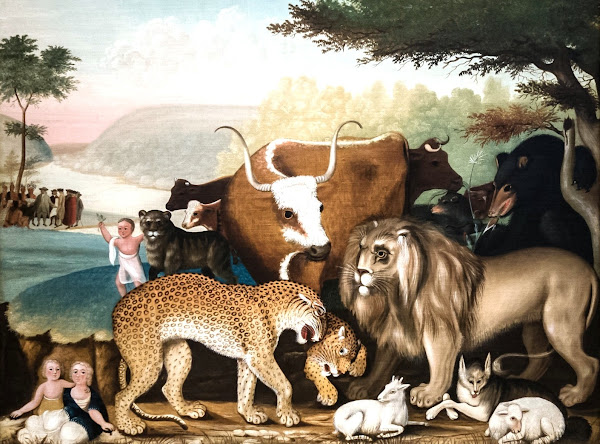Isaiah 2:1-5
1 The word that Isaiah son of Amoz saw concerning Judah and Jerusalem.
2 In days to come the mountain of the Lord's house shall be established as the highest of the mountains, and shall be raised above the hills; all the nations shall stream to it. 3 Many peoples shall come and say, "Come, let us go up to the mountain of the Lord, to the house of the God of Jacob; that he may teach us his ways and that we may walk in his paths."
For out of Zion shall go forth instruction, and the word of the Lord from Jerusalem. 4 He shall judge between the nations, and shall arbitrate for many peoples; they shall beat their swords into plowshares, and their spears into pruning hooks; nation shall not lift up sword against nation, neither shall they learn war any more.
5 O house of Jacob, come, let us walk in the light of the Lord!
Advent
Last Sunday we concluded the church's year by celebrating Jesus Christ,
…the image of the invisible God, the firstborn of all creation; in him all things in heaven and on earth were created, things visible and invisible, whether thrones or dominions or rulers or powers—all things have been created through him and for him. Colossians 1:15-16
As the northern hemisphere approaches the time of year with least daylight and inches toward the winter solstice, the first Sunday of Advent opens wide a new year of grace. We light candles at home and at church; glowing warmth from a fireplace or wood burning stove brings a lot of comfort in some homes. We ended the old year with a splash of apocalyptic (uncovering, revealing, signs and wonders in creation and in the everyday world along with coded speech or art that needs to be interpreted); we start the new year with apocalyptic, too. The unfamiliar, upside down, inside out, strangeness of apocalyptic literature or art signals "look! listen! the end of the world as we've known it!"
This new lectionary Year A features the Gospel according to Matthew for most of the gospel readings; today's apocalypse is a parable from Matthew 24:36-44. However, for these Advent Sundays I expect to blog about the first readings that all come from the first section of Isaiah (chapters 1 through 39) that's mostly from Isaiah of Jerusalem who ministered before the Babylonian exile.
Advent imagery and scripture subverts the status quo of violence, injustice, hatred, hunger, disease, and fear as the world anticipates God's arrival in our midst as a human baby. God in the manger? How counter-intuitive is that?
As we await and expect God on earth, close to us as one of us, advent is a season of hope. Blue, the color of hope, is the contemporary liturgical color for advent. With its emphasis on light that continues through epiphany along with its theme of hope, Advent is the favorite season for many people.
Advent 2022
Immediately before today's reading, Isaiah chapter 1 rants about the vision he saw concerning violence, bribery, injustice, empty religious festivals, sacrifices, and extravaganzas. In Isaiah 1:17 God charges us, "Learn to do good, seek justice, rescue the oppressed, defend the orphan, plead for the widow."
The first advent, ad-venire, coming, or arrival of Jesus of Nazareth happened in Roman occupied territory after 700 years of enemies—Assyria, Babylon, Persia, Greece, Syria, Rome. Advent imagery and reality subverts the status quo of violence, injustice, hatred, hunger, and fear as the world anticipates God's arrival as a human baby. Reformer Martin Luther insisted to see the fullness of God's power and the style of God's reign—"look to the Bethlehem manger! Look to the Calvary cross!"
During Advent 2022 we wait for Jesus' arrival into territory already occupied by: Covid? Armed conflict, maybe particularly the Russian Federation's (mostly President Putin's) war on the sovereign nation of Ukraine that has grieved Western hearts, though worldwide at least a couple dozen wars continue to rage? Competitive consumerism, especially during the gift-giving December holidays? Wall Street, the DOW and the NASDAQ? Crypto currency? Social media? Ethnic conflict? It seems as if stabbing has become the new shooting? What other death-dealing, life-negating entities and activities overwhelm our living spaces?
Today's Reading
Isaiah 2:1 "The word Isaiah…saw." A visible word! Hebrew here is dabar that denotes both speech and action. Visible words? How about us? Sacraments, visions, dreams, paintings… advertising art! Do you know Tom Wolfe's book, The Painted Word?
Isaiah 2:4, "…they shall beat their swords into plowshares, and their spears into pruning hooks; nation shall not lift up sword against nation, neither shall they learn war any more." Isaiah's 8th century contemporary Micah 4:1-3 also included this life-giving promise.
Paradox in this passage is Zion was not the highest mountain, and "the nations" were not caravanning to Jerusalem and Mount Zion. Also, God's people were not unique in considering their capital city the center of the world. Imagine!
Isaiah 2:3 "God of Jacob" – Genesis 28:13-15, Jacob's dream, Jacob's ladder: land; offspring; God's constant, abiding presence; homecoming.
All of Isaiah conveys an expansive worldview with a universalism that insists Yahweh is God of all, God for all. No more us and them!
Psalm 122:1-2 for today: I was glad when they said to me, "Let us go to the house of the Lord!" Our feet are standing within your gates, O Jerusalem.
